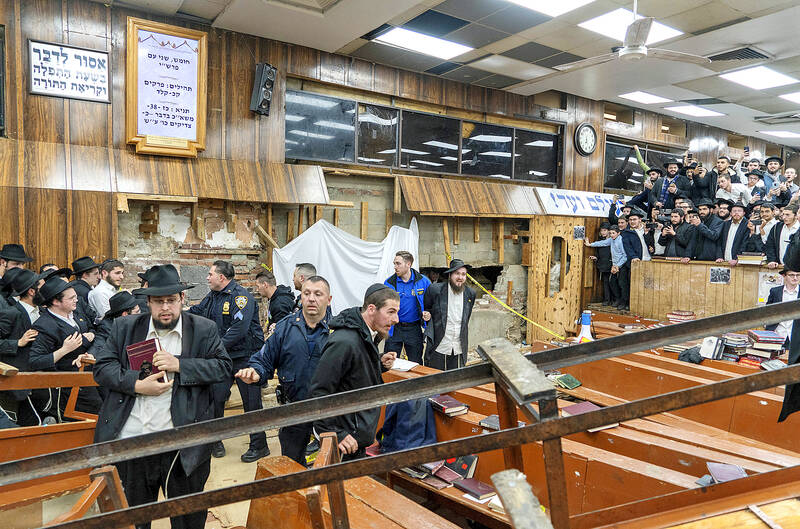New York officials have issued emergency work orders to stabilize a historic synagogue and its neighboring structures after an illicit underground tunnel was discovered at the sanctuary earlier this week.
An investigation by the city’s Department of Buildings uncovered a tunnel that was 18.3m long, 2.4m wide and 1.5m high, located underneath the global headquarters of the Chabad Lubavitch movement, an important Jewish site. It extends under several buildings in the vicinity.
“As a result of this extensive investigation, we have issued emergency work orders to stabilize the buildings above the tunnel, vacate orders in parts of the buildings to ensure occupant safety, and enforcement actions against the property owners for the illegal work,” Andrew Rudansky, a spokesperson for the buildings department, said in an e-mail.

Photo: AP
The property is a deeply revered site that each year receives thousands of visitors. Its Gothic Revival facade, immediately recognizable to adherents of the Chabad movement, has inspired dozens of replicas worldwide.
Officials and locals said young men in the community recently built the tunnel in secret.
When the group’s leaders tried to seal it off on Monday, supporters of the tunnel staged a protest that turned violent as police moved in to make arrests.
A spokesperson for the buildings department said the tunnel did not have approval and permits from the city.
City inspectors found dirt, tools and debris inside, they said.
Rabbi Motti Seligson, a spokesperson for Chabad, characterized the tunnel as a rogue act of vandalism committed by a group of misguided young men and condemned the “extremists who broke through the wall to the synagogue, vandalizing the sanctuary, in an effort to preserve their unauthorized access.”
Those who supported the tunnel, meanwhile, said they were carrying out an “expansion” plan long envisioned by the former head of the Chabad movement, Rebbe Menachem Mendel Schneerson.
Rundansky said the excavation work to create the tunnel caused structural issues at two buildings, resulting in orders to partially vacate them for safety reasons.

‘UNUSUAL EVENT’: The Australian defense minister said that the Chinese navy task group was entitled to be where it was, but Australia would be watching it closely The Australian and New Zealand militaries were monitoring three Chinese warships moving unusually far south along Australia’s east coast on an unknown mission, officials said yesterday. The Australian government a week ago said that the warships had traveled through Southeast Asia and the Coral Sea, and were approaching northeast Australia. Australian Minister for Defence Richard Marles yesterday said that the Chinese ships — the Hengyang naval frigate, the Zunyi cruiser and the Weishanhu replenishment vessel — were “off the east coast of Australia.” Defense officials did not respond to a request for comment on a Financial Times report that the task group from

DEFENSE UPHEAVAL: Trump was also to remove the first woman to lead a military service, as well as the judge advocates general for the army, navy and air force US President Donald Trump on Friday fired the chairman of the Joint Chiefs of Staff, Air Force General C.Q. Brown, and pushed out five other admirals and generals in an unprecedented shake-up of US military leadership. Trump wrote in a post on Truth Social that he would nominate former lieutenant general Dan “Razin” Caine to succeed Brown, breaking with tradition by pulling someone out of retirement for the first time to become the top military officer. The president would also replace the head of the US Navy, a position held by Admiral Lisa Franchetti, the first woman to lead a military service,

Four decades after they were forced apart, US-raised Adamary Garcia and her birth mother on Saturday fell into each other’s arms at the airport in Santiago, Chile. Without speaking, they embraced tearfully: A rare reunification for one the thousands of Chileans taken from their mothers as babies and given up for adoption abroad. “The worst is over,” Edita Bizama, 64, said as she beheld her daughter for the first time since her birth 41 years ago. Garcia had flown to Santiago with four other women born in Chile and adopted in the US. Reports have estimated there were 20,000 such cases from 1950 to

CONFIDENT ON DEAL: ‘Ukraine wants a seat at the table, but wouldn’t the people of Ukraine have a say? It’s been a long time since an election, the US president said US President Donald Trump on Tuesday criticized Ukrainian President Volodymyr Zelenskiy and added that he was more confident of a deal to end the war after US-Russia talks. Trump increased pressure on Zelenskiy to hold elections and chided him for complaining about being frozen out of talks in Saudi Arabia. The US president also suggested that he could meet Russian President Vladimir Putin before the end of the month as Washington overhauls its stance toward Russia. “I’m very disappointed, I hear that they’re upset about not having a seat,” Trump told reporters at his Mar-a-Lago resort in Florida when asked about the Ukrainian